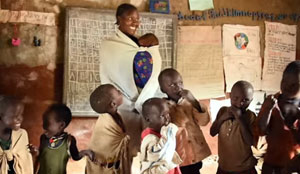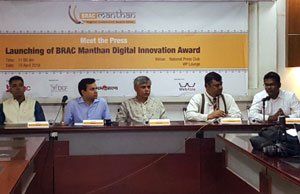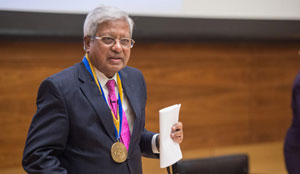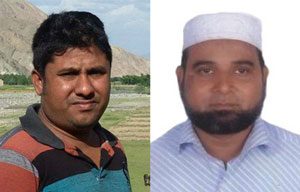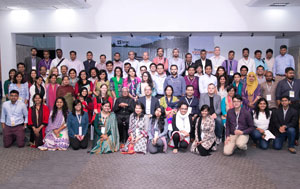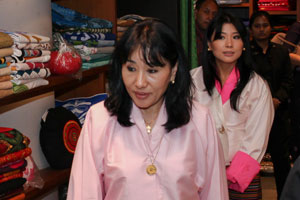
English (965)
Children categories
Workers deserve better protection
The government should establish a strong legal protection and permanent framework to ensure adequate compensation for the victims of factory disasters, experts said yesterday. They spoke at a seminar in the capital's Spectra Convention Hall, organised by Brac, on the eve of the third anniversary of the Rana Plaza tragedy. Three years ago, on April 24, the Rana Plaza building collapsed, crushing workers underneath and drawing the world's attention to the safety concerns. The country lost at least 1,136 lives, and 2,438 were injured and scarred forever. Read more
PSDF joins hands with BRAC
Punjab Skills Development Fund (PSDF) has joined hands with BRAC Pakistan, one of the largest non-governmental international development organizations in community health sector in the world which is based in Bangladesh.
PSDF Chief Operating Officer Ali Akbar Bosan and BRAC’s country representative& CEO Muzaffar-ud-Din signed the contract here.
Under the project, BRAC Pakistan will train 720 mature trainers who will impart training to 48,000 LHWs across the Punjab.
With improved skills, these LHWs would create awareness in community to improve health conditions at tehsil level, take active role to improve maternal, newborn and child health issues, help government to reduce child mortality rate and contribute in family planning services. Read More
BRAC and the LEGO Foundation Collaborate on Play-to-Learn Project
New York April 19, 2016
BRAC and the LEGO Foundation have announced a $4.7 million, three-year partnership to promote the importance of learning through play for early childhood education in Bangladesh, Tanzania and Uganda.
Designed to emphasize the quality of learning as a hallmark of strong early childhood education, BRAC’s low-cost, high-impact Play Lab project will reach more than 7,000 children, aged three to five, across the three countries.
BRAC, an international development organization, has a widespread presence in Bangladesh, Tanzania and Uganda, with established education and poverty alleviation programs. The LEGO Foundation is recognized worldwide for its deep knowledge of children’s development and learning processes along with the training and tools that educators need to release children’s potential. The partnership marks the LEGO Foundation’s first major investment in learning through play in Asia and strengthens its efforts in East Africa.
“Play is now widely recognized as a key facilitator in the emotional development of children,” said Devon Ritzer, Education Program Manager for BRAC USA, BRAC’s US-based affiliate. “Children are able to explore different aspects of their identity and increase collaboration through play.”
The pilot will also include training for 480 adolescent girls as paraprofessional play leaders, sessions for 7,200 parents on the importance of play and the creation of 120 Play Labs.
Play Labs are spaces for children to engage in play. When used in tandem with a play-based curriculum, they help educators ensure children are learning while also fostering early childhood development.
The paraprofessional play leaders will be drawn from BRAC’s Empowerment and Livelihood for Adolescents (ELA) program, which empowers teenage girls socially and financially and provides safe spaces for them to socialize and receive mentoring and life skills training.
“Evidence continues to link play to the development of executive functions, resiliency, creativity, problem-solving, social skills and emotional well-being,” said Aline Villette, Senior Programme Manager at the LEGO Foundation. “Allowing children to learn through play provides a strong foundation for learning and for life.”
The Centre for Play at BRAC University’s BRAC Institute of Educational Development in Bangladesh will play a key role in the initiative. The Centre for Play will design both the safe play spaces and low-cost learning materials for children.
The planning and design process will include the participation of community members to ensure that play environments are created in homes and community hubs that lack play spaces.
The joint project will also establish a global network of play-based learning experts to gather and assess international best practices, adapt and develop curriculum and materials, build staff capacity and advocate for children’s rights to access quality learning.
To assure the quality of the spaces and age-appropriate effectiveness of the play materials, while also providing opportunity to innovate throughout the project, the collaboration will also spearhead research and help develop assessment tools to monitor and evaluate the Play Lab model.
BRAC launches the prestigious Manthan Awards
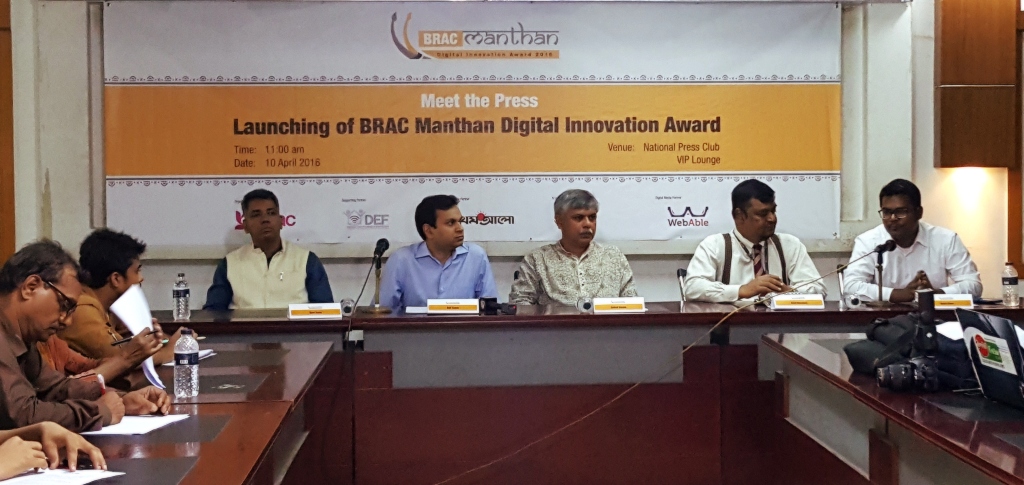
From left Ravi Guria, Asif Saleh, Anisul Hoque, K A M Morshed and Ovick Alam.
BRAC launched the prestigious Manthan Digital Innovation Award (BMDIA) 2016, on 10 April, for the first time in Bangladesh. The award, an off-shoot of the Manthan Awards in India, promotes the use of technology for the development and focuses on newer digital and mobile innovations.
BRAC in partnership with Digital Empowerment Foundation (DEF), an India-based non-profit launched the awards on National Press club today. Manthan Award, initiated in 2004 by Digital Empowerment Foundation promotes and recognises the contributions of individuals and organisations in the field of ICT for development.
Upon launching, deputy programme manager of DEF Ravi Guria said, "Bangladesh has been one of the most prominent participants in the Manthan award for years. We have to create an environment for the young innovators to make innovations that can have a positive impact in the most marginalised people of the country. This is why we are launching Manthan in Bangladesh."
From this year, Bangladeshi applicants will only be able to participate in the Manthan Award in India by winning the BRAC Manthan Digital Innovation Award in Bangladesh. Appreciating this initiative Anisul Hoque
from Prothom Alo said, "ten years before, a child from Bangladesh's Char area could not even imagine to have quality education, but thanks to technology, today we can ensure that. A child living in the remotest Char area can have the same education like a child living in the city. So we have to encourage the youth of our country to participate in this kind of initiatives which will take our country forward in the coming days."
The nine categories of the BMDIA 2016 are: e-business and financial inclusion, e-education, learning and employment, e-agriculture and ecology, e-governance and institutions, e-health, e-women, inclusion and empowerment, e-news, journalism and entertainment, e-culture, heritage and tourism, and m-content.
The registration for interested applicants would be open from 11 April to 10 June 2016. Notable individuals from the technology sector of South Asia will assess the applications on the quality of their content, impact of the solution, functionality of the product/service and benefits to people. The winners of the awards will be announced on September 2016. The winners of the BMDIA will get direct nomination to the Indian Manthan Awards and will represent Bangladesh there.
The press conference was moderated by BRAC's senior director Asif Saleh. Explaining the award nomination process he said, 'mobile and internet are bringing groundbreaking changes in the way people are interacting with the world around themselves. These newer digital services are reaching more people than ever and improving the quality of people's lives. BRAC wants to use that momentum and recognise those innovators who are catalysing these changes."
A number of Bangladeshi initiatives have won this award in the previous years in India, including A2i's e-purjee platform, bKash, Maya.com.bd, British Council's EITA project with BRAC, Amader Kishorganj, Infolady, Amar Desh Amar Gram. As the number of Bangladeshi applicants are rising for the Manthan Awards, BRAC has decided to bring this award in Bangladesh to promote and encourage a positive and working environment in ICT for development in here.
Ovick Alam from WebAble, the digital media partner of this award said, "122 million people in Bangladesh use mobile and 63 million use internet connection. Only 55% of this population is urban. We need to bring a paradigm shift from being urban focused to going country-wide. BRAC Manthan stands for that shift. It encourages people all over the country to bring tech-based solutions for mass people."
Present at the conference were BRAC's senior director Asif Saleh, director of advocacy and technology KAM Morshed, Prothom Alo's associate editor Anisul Hoque, Prothom Alo's development programme coordinator Munir Hasan, DEF's deputy programme manager Ravi Guria and WebAble Digital's co-founder and director Ovick Alam.
Prothom Alo is an associate partner of this initiative and WebAble Digital is the digital media partner of BMDIA 2016 while Channel 24 is supporting this initiative as the TV media partner.
For more information and nomination please visit http://brac.manthanaward.org/
Sir Fazle Hasan Abed receives Thomas Francis, Jr. Medal
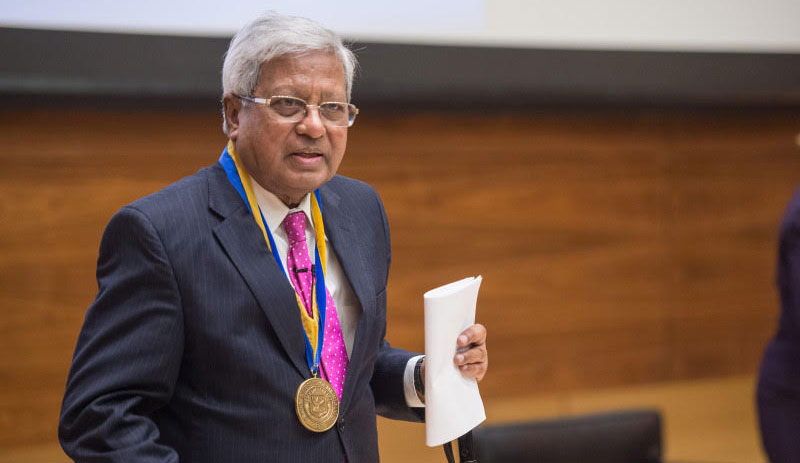
Sir Fazle Hasan Abed, KCMG, founder and chairperson of BRAC, was given the Thomas Francis, Jr. Medal in Global Public Health award by the University of Michigan. Mark Schlissel, president of University of Michigan presented the medal at a ceremony at the Ross School of Business on April 6, 2016.
Sir Fazle has been recognised for his advancement of global public health and work to establish a healthier future for people living in poverty worldwide. The medal, periodically awarded to a global leader whose work addresses the most pressing global health challenges, honours the legacy of the University of Michigan epidemiologist who mentored Dr Jonas Salk in his development of the polio vaccine.
"It is indeed a great honour to receive the Thomas Francis, Jr Medal in Global Public Health," said Sir Fazle at the award ceremony. "It gives me tremendous pleasure and I thank the University of Michigan for bestowing this prestigious award on me."
"In global development, it is not a lack of new and bright ideas that is impeding progress but rather our ability to implement these ideas well, effectively and at scale," said Sir Fazle. "There is much excitement today about the potential of new technology to end human poverty. This can make us forget that many solutions already exist. We can reach millions more today by focusing less on 'what' and more on 'how'."
In the 1970s, BRAC pioneered a new approach to treating diarrheal disease in Bangladesh. Known as Oral Rehydration Therapy (ORT), BRAC reached 12 million mothers almost entirely through person-to-person education, revolutionising health delivery in the country. Bangladesh now has the world's highest ORT usage rate, providing a case study in how to do a good thing better. In addition, between 1990 and 2011, Bangladesh saw a two-thirds reduction in mortality rates for children under the age of five. As a result, the country met the 2015 health standard set by the United Nations.
Today, BRAC breaks the cycle of contamination caused by limited access to toilets, latrines and safe water sources, especially in rural areas. Nearly one in three people worldwide – 2.5 billion – don't have access to adequate sanitation and nearly one in nine people – 800 million – don't have access to clean water.
By focusing on innovation, technical assistance, and community-based education, BRAC water and sanitation for health (WASH) committees have reached 38 million people, largely in rural areas of the country.
BRAC officials abducted in Afghanistan have been released
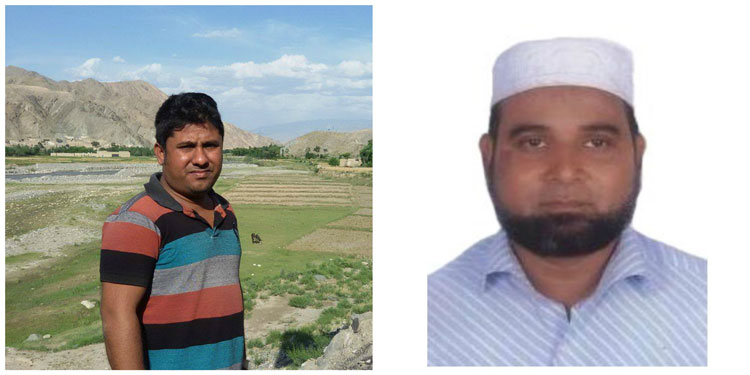
BRAC Afghanistan's staff KM Sirazul Islam (left) and Mohammad Swakat Ali (right)
Two Bangladeshi BRAC officials abducted in Afghanistan have been released after 18 days. Both Haji Swakat (50), and Md Sirajul Islam Sumon (37) returned unharmed to BRAC Kabul office on the morning of April 4.
Regional director of BRAC International, Asia, Jalal Uddin Ahmed said, "The release was ensured through the mediation of the local Surah leaders. We are very happy on their safe return. Both have spoken to their respective families in Pabna." Jalal Uddin Ahmed went to Kabul right after the abduction on 17 March.
Executive director of BRAC International Faruque Ahmed said, "We are relieved that our colleagues are safe and unharmed. From the very beginning ensuring their safe release was our top priority and I am glad that we have been able to achieve this. We are grateful to the families for their patience during the last two weeks." He also thanked both the governments of Afghanistan and Bangladesh, provincial governors, police and Surah leaders of Baghlan and Kunduz provinces for their relentless support in this critical time.
Haji Swakat and Md Sirajul Islam Sumon were abducted from Kunduz, Afghanistan on 17 March on their way back to Baghlan office after a field visit.
BRAC holds Frugal Innovation Forum 2016
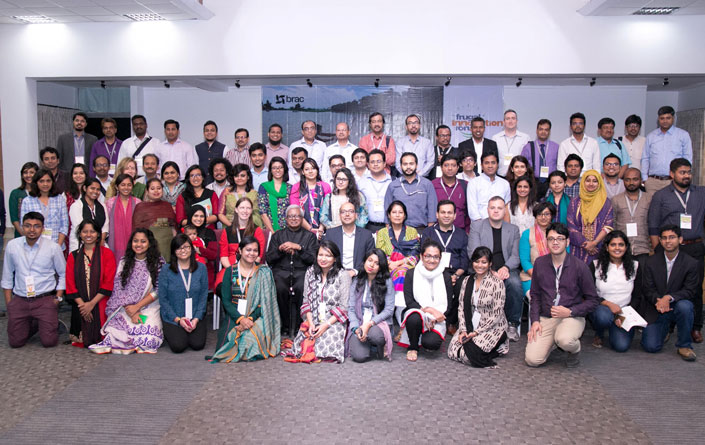
BRAC held the fourth Frugal Innovation Forum from 23-24 March 2016 in Savar, Bangladesh with the theme of scaling resilience. The forum showcased financial, social, and technological innovations that non-governmental organisations and other implementers are using to strengthen communities that are facing the effects of climate change.
The forum was designed to explore effective innovations and create opportunities for dialogue among leaders in the global south. Speakers from organisations that are building resilience in innovative ways, such as Goonj, iDE Nepal, The Mojolab Foundation, and Medic Mobile were featured in panel and plenary discussions. In addition, representatives from various grassroots organisations and thought-leaders on the subject including Ainun Nishat, Jaideep Prabhu, Rizwana Hasan and Arif Jebtik also presented and highlighted ways to build resiliency in the face of natural and man-made disasters.
“Resilience-building mindsets and creativity at the community and government level are necessary for communities to not only cope when faced with disaster, but to thrive,” Jaideep Prabhu said during the opening session. Mr. Prabhu said that top-down policies need to be balanced with grassroots, bottom-up solutions to build resiliency ahead of disaster.
The major sessions included financial innovations to foster household resiliency, innovations in adaptive livelihoods and agriculture, and also explored how policy can strengthen communities ahead of natural disasters in South Asia.
The two day long forum ended with a session with BRAC founder and Chairperson Sir Fazle Hasan Abed moderated by Mr Prabhu. The discussion mostly focused Bangladesh’s growth in the last few decades. Highlighting some of them Sir Fazle said that Bangladesh’s life expectancy at birth is higher than that of Pakistan and India although both the countries have higher per capita income than Bangladesh. But unfortunately, the country has a long way to go in terms of ensuring gender equality and meeting the growing demand of urbanisation.
Queen Mother of Bhutan visits BRAC
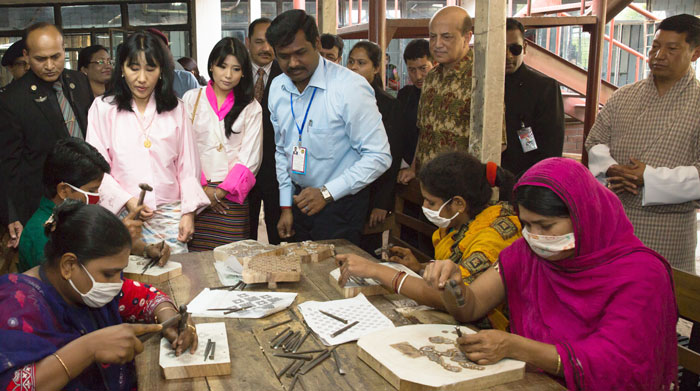
Her Majesty the Queen Mother Ashi Tshering Pem Wangchuck of Bhutan visits BRAC on her first trip to Bangladesh. As President of the Bhutan Youth Development Fund (YDF), Her Majesty is here for a five-day study trip to explore possibilities for collaboration between BRAC and YDF.
On Tuesday, 15 March, Her Majesty met with Sir Fazle Hasan Abed, the founder and chairperson of BRAC, at BRAC Centre. Admiring Bangladesh she said, “I am very impressed to see Bangladesh’s growth. I can see the discipline and it’s phenomenal.” She added, “We are very keen to collaborate with BRAC. It is remarkable that BRAC has touched so many lives and we have so much to learn from BRAC’s success.”
Thanking Her Majesty, Sir Fazle said, “Bangladesh is on the path to increase development growth rate. Last year it was 6% and we are hoping this year it would be 7%. But still 20% people live in poverty and BRAC is working to eliminate poverty and provide equal opportunity to all. We will be happy to collaborate with YDF”
In the evening, Her Majesty met the Honorable Prime Minister Sheikh Hasina at the Gonobhaban.
Her Majesty and YDF officials visited BRAC’s Ayesha Abed Foundation production centre and the Aarong Flagship Outlet on 16 March, Wednesday.
Her Majesty the Queen Mother was accompanied by Her Royal Highness Ashi Chimi Yangzom Wangchuck, the Vice President of the YDF, Ambassador of Bhutan to Bangladesh Her Excellency Pema Choden, YDF officials, and officials from the Royal Bhutanese Embassy in Dhaka.
Two BRAC officials abducted in Afghanistan

BRAC Afghanistan's staff KM Sirazul Islam (left) and Mohammad Showkat Ali (right)
18 March 2016, Dhaka. It is with great regret that we announce that Engineer Mohammad Showkat Ali, Chief Engineer, National Solidarities Programme and KM Sirazul Islam, Regional Accountant, Girls Education Challenge (GEC) project were abducted on 17 March 2016 from Shenowari of Baghlan e Markazi district under Baghlan province in Afghanistan. The incident happened when they were returning to Kunduz province BRAC office from a scheduled field visit.
BRAC is fully engaged in dealing with this crisis. BRAC Afghanistan authorities are in constant communication with the law enforcement agencies and the local administration and also has dispatched a team to Baghlan to coordinate the rescue efforts.
In immediate response, Ministry of Foreign Affairs of Bangladesh and Ministry of Interior of Afghanistan have assured their full cooperation.
BRAC officials in Bangladesh have been in communication with the families of Showkat and Siraz, keeping them informed of the latest situation and providing all necessary support.
BRAC has been in operation in Afghanistan, the first country presence of BRAC International, since 2002 helping the country to rebuild after the war. It currently runs programmes in health, girls education and is a partner of the Afghan Government in their National Solidarity Programme initiated to rehabilitate 5000 villages in Afghanistan. Its total budget for 2016 is about 15 million USD and it has a staff of 857 with about 61 of its staff being from Bangladesh and rest being from Afghanistan.BRAC's Afghanistan operation has reached 5.6 million people so far. For more information on our Afghanistan programme, click here.
BRAC is working all out to ensure a safe and speedy release of its abducted staff members.
Safe Spaces for Women at Workplace
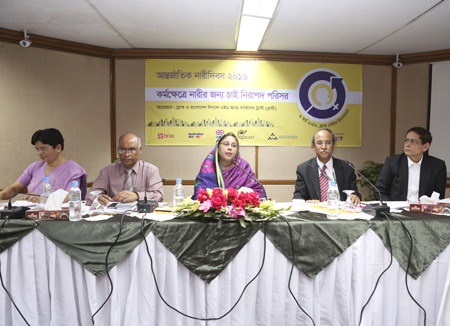
“Ensuring safety at workplace can help increasing women’s participation in the working sector” -said state minister of MoWCA Begum Meher Afroze Chumki, MP
State minister for Ministry of Women and Children Affairs (MoWCA) of Bangladesh Government, Begum Meher Afroze Chumki, MP, emphasised on women’s safety at work place to increase women’s participation, at a national dialogue today. The dialogue titled “Safe Spaces for Women at Workplace” was jointly organised by BRAC and Bangladesh Legal Aid Services Trust (BLAST) to mark International Women’s Day 2016.
As more women are participating in work outside home than ever before, ensuring safety for women at their workplaces has now become one of the most pressing agendas. Although the High Court issued a directive in 2009 to prevent and provide protection against sexual harassment at all workplaces, compliance with this directive is still not up to the mark. The dialogue was organised to start a conversation among private sector organisations to address the issue.
Barrister Sara Hossain from BLAST highlighted the nature of sexual harassment and what are the barriers for women to complain against it. She also put emphasis on the high court directive on sexual harassment redressal in her presentation. She said, “Even after seven years of the high court directive on sexual harassment redressal, it has not been made a law. In addition to this, the conditions or exact penalty in case of non-compliance with the directive is still not clear.” In her presentation she also stressed that the guideline only talks about the women, there is no mention of the third gender.
Maheen Sultan, visiting fellow of BRAC Institute of Governance and Development made a presentation on “Addressing sexual harassment in the garments sector: Good practices and findings”.
BRAC’s programme head of human rights and legal aid services (HRLS) Sajeda Farisa Kabir’s presentation addressed BRAC’s experience and learning in Addressing sexual harassment in the workplace. BRAC has more than a decade of experience in addressing sexual harassment issues at workplace, providing support to its 112,934 national staff, working in 64 districts and more than 8,000 staff working in 11 countries.
Present at the event were representative from private sector organisations like Nestle Bangladesh, Afroz, Incepta. The dialogue was moderated by BRAC's executive director Dr Muhammad Musa.
Join the world’s biggest family

